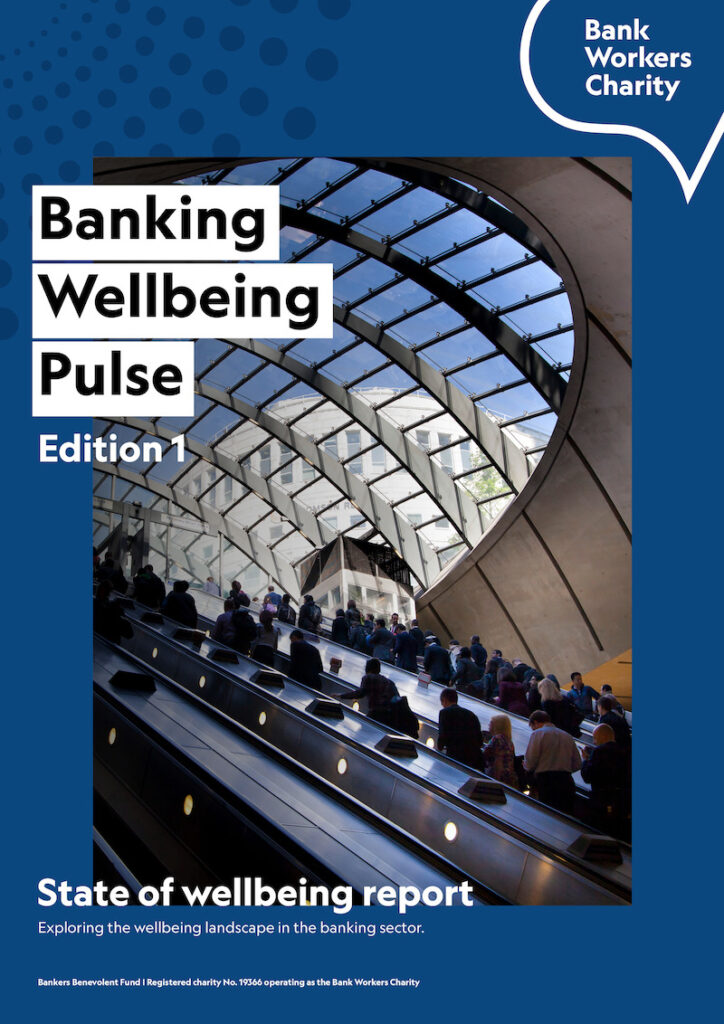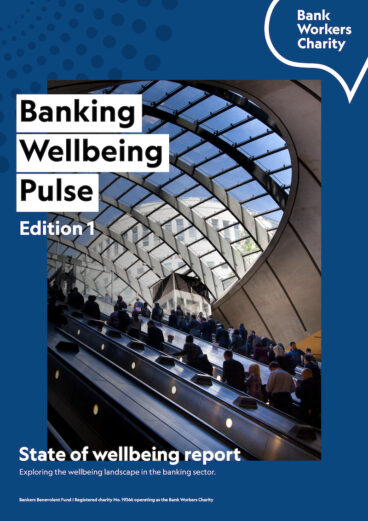In most respects, bank employees are pretty representative of the UK population, so we’d expect them to mirror wellbeing concerns that are prevalent in society at large. In this section of the report, we highlight two particular wellbeing issues that our usage data tells us are currently pre-occupying the banking community. Most obvious is that financial wellbeing issues are a major concern for bank employees, just as they have been for so many people during the cost-of living crisis.
Another topical wellbeing issue resonating with our service users, is children and young people’s mental health. Public attention has been drawn to this issue through the campaign work of broadcaster Roman Kemp, particularly in his documentary “The fight for young lives” which aired in 2023 on the BBC. This has done much to raise awareness of, and concern about, the care gap that exists around mental health for children and young people. As we’ll see shortly, it troubles many bank employees too. First, let’s look at financial wellbeing.
Financial wellbeing problems
As we’ve seen in our special report, long before the cost-of-living crisis hit in 2020, money worries were having a major impact on people’s wellbeing. At the Bank Workers Charity, financial problems have always represented a significant proportion of our work, accounting for around a third of all our cases, even before the pandemic. And we’d also see the impact of those financial difficulties on other areas of wellbeing. Many of those seeking help with money problems also sought counselling for their mental health, or to deal with the damage being caused to their close personal relationships.
It’s widely acknowledged that the cost-of-living crisis thrust into difficulty many people that had not previously struggled with their finances. That being so, it’s not surprising that some bank employees discovered their household finances were precarious. Indeed, if we look at our data from the 1 April 2022, well into the financial crisis (agreed by commentators to have started in late 2021), we find that the majority of cases we dealt with involved financial concerns.
61
of all cases from current and former bank workers dealt with financial concerns
Some of those we support simply need advice and guidance to get their finances back on track – perhaps to manage debt or to create a budget for the first time; something we do with the support of our charity partner, StepChange. Others, in more straitened circumstances, need a financial injection to move things forward and we do this by providing grants. It’s a measure of the present level of need that, of 1,809 grants that we’ve paid out since 1 April 2023, 1,404 have been to address financial difficulties.

Maximising income
However, when we’re dealing with financial wellbeing issues, we don’t simply give out grants. Our goal is to help stabilise people’s finances in a sustainable way and that means helping them to secure income they may be eligible for or entitled to. Many don’t claim welfare benefits because of the misapprehension that, if they’re in employment, the benefits won’t be available to them. In fact, every year there is £19 billion in unclaimed welfare benefits, much of it available to people in work. This is an area where we’ve been able to make a huge difference. Between April 2023 and the end of November 2023, the Bank Workers Charity helped people access over £677,000 through the welfare benefits system or from other charities.
Economic projections now suggest we may have turned a corner, with inflation having reduced to 4.8%. Yet in January 2024, energy prices remained high, and we expect financial wellbeing issues to feature prominently in our work for some time to come.
60
higher gas prices than in 2021
40
higher electricity prices than in 2021
30
higher food prices than in 2021

Children’s mental health
According to recent research from Pew in the US, parental fears about their children’s mental health are soaring. More than abduction, bullying or abuse of drugs, worries about mental health top the list of parental concerns. We’re seeing the same trend in the UK and for similar reasons. Mental health problems among children and young people have soared over the last 10 years and current NHS resources are woefully inadequate to meet the demand. The figures tell their own bleak story.
7
of children attempt suicide by the age of 17
1 in 6
children are believed to have a probable mental health condition since the pandemic
3x
referrals for children with eating disorders since March 2021
Source : Studies by the British Journal of Psychiatry, The Children’s Commissioner and Royal College of Paediatrics and Child Health
To control the scale of demand, many of the NHS’s 54 mental health trusts in England have raised the threshold of how ill under-18s must be before they get treatment. Waiting lists have now lengthened and in a Young Minds survey of almost 14,000 young people, more than one in four said they had tried to take their own life as a result of having to wait for mental health treatment.
Such inadequacy of support, at a time of surging demand, has left many parents in despair. It’s a measure of the NHS’s inability to respond, that so many employees are turning to charities like our own to gain access to advice and support. Indeed, when we recently promoted our webinar on children’s mental health, which highlights the full range of resources available to support children and to advise parents, nearly 2,000 people registered to attend.
How we’re helping
In 2019, having already seen the warning signs, the Bank Workers Charity looked to widen the range of support it offers. We contracted with Kooth, the online mental health platform, to enable us to offer more services to children and young people. Through Kooth children and young people can gain access to a wide range of resources to support their mental health, including:
- Goal setting tools
- Mood trackers
- Peer-to-peer support forums
- One-to-one text chats with a qualified counsellor
With Kooth everything is moderated, so it’s a completely safe environment. Importantly, the date of birth of the child is entered when registering and this ensures that younger children can’t access materials intended for someone much older. As we anticipated, the demand for access to Kooth has been high and we have made 426 referrals to them since we first promoted the platform in 2019.
The Bank Workers Charity also funds counselling for children and young people though our longstanding partner Relate. Between 2021 and 2023, we saw a fivefold increase in the numbers of counselling referrals we made to them, paralleling the growth in waiting lists that was proving so problematic for parents. Like financial problems, this too is an area of need that reflects a wider societal problem and it’s one that is unlikely to reduce significantly, at least in the short-term – the support simply isn’t there. The charitable sector has become a vital resource for parents trying to safeguard the mental health of their children and the Bank Workers Charity will continue to play an important role here.
Future iterations of this report will explore the different ways that usage of our services by the banking community mirrors wider societal wellbeing trends or provides insights into the prevalence of particular concerns among bank employees.


